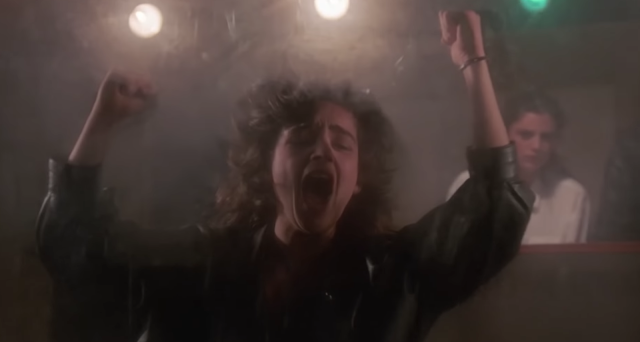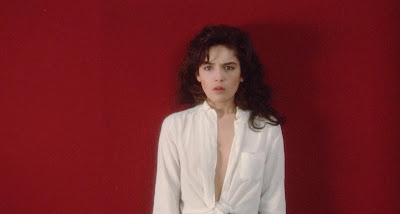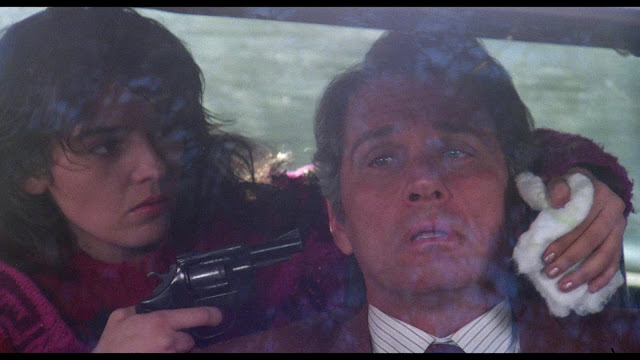
"Sex is nostalgia for when you used to want it... Sex is nostalgia for sex." - Andy Warhol
“The male has to will his sexual authority before the woman, who is a shadow of his mother and of all women. Failure and humiliation constantly wait in the wings. No woman has to prove herself a woman in the grim way a man has to prove himself a man. He must perform, or the show does not go on. Social convention is irrelevant. A flop is a flop.” -- Camille Paglia, Sexual Personae
"War does something to a man, (it) takes away the gloss." - (film-within-film dialogue overheard while a sadistic sax player shocks his girlfriend by getting fellatio from his fey music producer in a Venice Cinema)- The Devil's Honey
Can only an emotion as strong as grief wake you up to the emptiness of a love based on debasement and humiliation---even if that sex is super hot (and takes away your usual baseline suicidal ideation), in the way only sex with a crazy sadistic-abusive super freak can be? Lucio Fulci knows. And he's using a distributor's brief to deliver another 9 1/2 Weeks (a big-ass hit in Europe) to answer the kind of tough questions9 1/2 director Adrian Lyne would pee himself in fear if you ever asked him. In short, if 9 1/2 Weeks is a naughty couples-only dip into Sandal's 'bondage night' (safe word posted on the wall in case you forget), Fulci's The Devil's Honey is a hard pistol butt thwacked in your face, followed by a little waterboarding in the romantic beach side surf. And not a lifeguard or a safe word for 5 kilometers in any direction.
Don't say 'it's just sex' like you'd say "it's just leprosy.' Sex is serious.
Our sex drive, it seems is itself a crazy sadistic-abusive super freak, demanding ever greater risks of safety, self-esteem and sanity just to get the same old rocks off. Safe words kill the fantasy as sure as condoms kill our 'sweet sensations.' With the intrusion of 'sanity', it's just play-acting. like sooner or later an opiate addict needs too much for his body to handle, stranding him on the shrinking sandbar between the overdose abyss and the encroaching tide of withdrawal, so too the sex addict thrill seeker has to resort to Hellraiser- style "Jesus Wept"-style agonies for the same old kicks. Our common sense kicking and scream to be let off the ride, even as our subconscious paralyzes us with aroused excitement with every clank up the ramp. The alternative in each case is the hell of boredom, of safe healthy relationships and responsible bed times, wherein every life-affirming smile of your boring ass spouse, their big box of prophylactics and safe word rolodex ever at the ready, makes me want to rip your own genitals out and nail them to the front door.
But wait, is that danger seeker even really us, or have we been taken advantage of by some sadistic lover who allies with our unconscious sex/death drive against our ego's judgement? On some level we know a lot of this abuse is all being done to please us. We forget how quickly our comfort zones shrink to noose size if left unassailed. And so we learn to hitch ourselves to loose canons, only to then complain when they roll all over our decks, crashing into mizzenmasts and crushing our toes?
In other words, is it still rape if you call them for another date the next night? That question has been legally answered since the 80s, thank god, but there's a whole other line of moral questioning, posed only in brave films like Bitter Tears of Petra von Kant, Duke of Burgundy, Belle du Jour and The Devil is a Woman -- films which carry a lot of Criterion cred, that go all the way around to the back door of the same thorny issue, and are all considered art. But add a Lucio Fulci film like The Devil's Honey to their midst and those film snobs start sneakin' away, quietly striking your name from their bourgeois opening invite lists. AND I'M FINE WITH THAT! You can take those lists and stick 'em in your undiscovered country.
Yes Honey, like much of Fulci's work, is too tawdry to the bourgeois types to give the same leeway they give to Bunuel or Fassbinder. And yes, it's a film where a saxophone solo is blown between a sexually supercharged girl's naked thighs in a red sound booth while his producer and engineer are out having lunch. And yes it's guilty of things that were having a last gasp back in the mid-80s, when every European filmmaker was chasing the elusive butterfly of
If Bunuel or Von Sternberg were around today, would they know what to do without the heavy breathing hypocrisy of the censors lending their every cryptic gesture a portent at once sophomoric and heroic? When forced to bury sex under mountains of respectability, that you get sex through somehow anyway is heroic, the way drinking during prohibition was considered patriotic by many of the writing class ('hic') I have the same problem now with marijuana, when you could go to jail for having a single joint, being part of the in-crowd carried outlaw cachet. Now, you're just another consumer, so who cares? A Fulci special isn't going to shock with sex when sex isn't shocking. He's too 'gone' for that- he'd rather bypass sex altogether, to get at the ugly truths not of love but of 'what it takes to keep your partner's interest, and your own' - the sex drive is, as Camille Paglia point out, very un-PC. Nature observes no moral code aside from might makes right, it's the whole reptilian cortex kind of shit, domination and sublimation. The only way out is through awareness, real Lacanian confrontation with the hideous staring eye at the center of horror of raw, undiluted existence, where Kali rips heads off of soldiers with one set of arms, and screaming babies out of bloody wombs with the others. So. much screaming and yelling - the only way to drown it out is to scream yourself. Fucli says, hey - go ahead.
Because you see, gore and eyeball mutilation are the specialty of la Casa Fulci. Sex is something for Jess Franco or Jean Rollin, or even Joe D'Amato. Fulci wants no part of it. You can call some of his films misogynist, but he never fetshizes female suffering or the female body (beautiful faces and hair, yes, shapely figures, no) he presumes instead upon a Carol Clover kind of "Her Body Himself" projection. There's no objectification of the female form with Fulci since in nightmare logic there can. be no 'satisfaction' or cuddling. Lust is a prison where the only release from your cell is enough gratification to stop the biological belittling for a little while, it buys you some time, like a $10 tray that at least takes your gorilla jones away, to paraphrase Girl Scout Heroin Gil Scott-Heron It's sex as a hungry ghost pining for the time before it mattered.
For Fulci it's all just a dead end to the path of the 'stare' - not the 'gaze' but the 'stare' back at the gazer. Someone like De Palma emulates Hitchcock but Fulci 'one ups' that kind of scopophilia by emulating Dali instead - i.e. going right for the eye. Like Oedipus, Fulci knows that that the smallest of return stares can snowball into the murder of children (Don't Torture the Duckling) or lesbian neighbors (Lizard in a Woman's Skin). So the safe move for all humanity is if we just gouge those offenders out right now. Ah, but what movie do you see when that cloud editor's knife ravages your one good moon like a Melies rocket? You already know the answer.
Fulci makes movies for the post-envisioned, forging a detour through the dream pineal pipeline, the dreamer's magic box, wherein we can behold our own blindness with rueful amusement, fully aware of the paradox but just not giving a shit.
WITHOUT CENSORSHIP, SMUT IS NOT SEXY.
For someone like Hitchcock, the handcuffs and short leash of censorship and his own Catholic guilt, keep him 'peeping' through keyholes to the end. For him and his disciples, Catholic repression is the ultimate aphrodesiac. Hitch could funnel acres of sex into a single drag on a cigarette. With Fulci, the funnel spills out on the ground, the soggy cigarette explodes and the smoker vomiting ever last acre of sex back up and all over the floor. For Fulci, if a naked woman is presented for our gaze it's scary because she's looking back at us--to use Rear Window parlance, it's as if "Ms. Torso" suddenly whirls around and stares back up through Scotty's zoom lens in a way that would make Lars Thorwald pee his big boy pants.
"There isn't any reason, and I wouldn't want you to go around thinking that there was." - Ned Beaumont to the DA, The Glass Key (Dashiell Hammett)
In the sordid psycho-sexual chamber piece that is The Devil's Honey, the two male characters in the film straddle the disinterested whore of time, as if two aspects of the same man - one the tired, middle-aged male surgeon (Brett Halsey) with the stricken look of men my age when we finally see what lies at the bottom of the hill we're finally over (and we realize the car we're locked in has no brakes, or reverse, or door, or seatbelt, or steering wheel), and the younger, sadistic adrenaline junky colossus of the lite jazz saxophone scene who flies into a rage if his girlfriend ever wants to cuddle. In other words, he's on the upside of the hill, where the top is all he can see. He considers himself immortal, a god. Sex has made him into an ogre, the sadist, but is he like that because he 'gets' his girlfriend, knows how she sexually responds to being a 'piece of meat' to him?
On the other side there's no doubt the burnt-out (Fulci-stand in?) surgeon played almost too well by Halsey, is trying to treat his hooker like a piece of meat (1t) , or at any rate she treats him like a temporary annoyance that's over before she can figure out if she even likes it, peeling her still-warm chewing gum off the mirror on her way out - no sense wasting it, and he treats her roughly the way a crippled kitten might play at being a lion for a few seconds before shrinking back into a world of consumptive coughing. His wife meanwhile longs for some sexual contact, wishing he'd man up. She's forced to say embarrassing things like: "Treat me like a whore," and, after she leaves him: "There's no use coming back unless you take me to bed," He'd rather mope, and never thinks to take his phone off the hook long enough to get her where she needs to be.
Though he's extra stricken by her departure, he's stricken like Florence Pugh's boyfriend in Midsommar, cowed by some ego ideal he feels he needs to embody even while every fibre of his being is struggling to rid himself of her. After she leaves and Halsey's eyes say it all - he'd rather be abducted and brutalized by an unhinged hottie than deal with Corinne Clery and her big haunted pleading eyes. Needless to say, he never goes home after this,
Fans of YOR! (and who isn't?) know exactly how this feels; Clery does the insecure possessive clinging GF almost too well. She's got all the goods in all the right areas, but there's something about her that makes you want to chew off your own arm rather than wake her up and there's no clear reason why other than her neediness. Halsey is maybe a little too adept at seeming world weary and flaccid to the point we viewers long for his delivery from feeling obligated to feel bad about her wanting out. Nothing is more tiresome in a movie than a character halfheartedly trying to stop a girl from leaving him that you feel deep down he wants her gone too, but can't admit it, because he's told himself he's not that kind of a guy. We saw this most recently in Midsommar, but it goes back to the start of Antonioni's L'Eclisse (1961) where we watch the morning after some apparent all-night breakup, as some lame dude lopes miserably after Monica Vitti, until we finally rejoice when she closes the gate on him. Antonioni knows we hate this guy on principle, just like we hate the guy in Midsommar, that he drags us through it all anyway shows us that, like Fucli, he's a sadist in ways not quite associated with pain or mastery. Above all he plays against expectations, and every camera move or line is 'off' in a telling way. There's the absurd idea that there could ever be a lite-jazz sax player with a groupie (in the US especially). Eve shot of Jessica walking outside, mourning him by wearing his sweater, seems unreal. A long tracking shot as she glides down a line of white fencing on her way to the doctor's car, in the rain, is given a surreal gleam, as we seem to be gliding along after her. And when she pulls out a knife to threaten our abducted doctor - the music doesn't get predictably ominous but surges into big guitar stings and jangly 80s air rock.The Opposites Subtract Effect
It would be nice if we saw any change in Halsey's tired demeanor after this drastic turn of events. But aside from the dog scaring him so much he pees his pants, or when he watches her smash up his car with a hatchet, there's not much he offers in the way of reaction-- his eyes have that stricken sad guy look, the kind of mid-age crisis where you're over and start going down the hill - and see the spikes at the end, and there's no brakes or steering wheel, no way to unfasten your safety belt. All you can do is stare in that stricken way - and let it come.
 I tell you what though, Blanca Marsillach is rather amazing as Jessica. Singing and laughing to herself, eyes wide, staring - staring at him saying "Why did you let him die?" over and over, smiling gleefully - laughing ("so the great surgeon has peed in his pants."), Marsillach, you're one for the ages!!
I tell you what though, Blanca Marsillach is rather amazing as Jessica. Singing and laughing to herself, eyes wide, staring - staring at him saying "Why did you let him die?" over and over, smiling gleefully - laughing ("so the great surgeon has peed in his pants."), Marsillach, you're one for the ages!!
"I can look straight into your eyes," she says
As she walks around the beach house, moments from her past with Johnny seem to be happening at the same time. He seems always around the corner, coming down the stairs or out from the beach; the only difference is in lighting filters. When he says "You know I always come back," we wonder if he's a ghost, until he says "I can't live without you." Dude, I wouldn't worry.
Unless we've seen some Argento movies we may find it strange she's made so violent by the death of the man who treated he so meanly. But we who've seen The Stendahl Syndrome, Bird with the Crystal Plumage, etc., we know better. We also may know if we found ourselves adopting some of our ex-lover's habits after we separate from them, drinking their brand of whiskey, etc. We unconsciously move our habits around to accommodate for the sudden absence. Here it's forcing the doctor to eat dog food. Forcing him to operate on a doll she got from Johnny that he later broke in a violent rage. ("I love you I love you. Can't you say anything else?" he shouts, as if her string is broken). Eventually her memories stray from the house into Venice, made Don't Look Now uncanny, with Fulci once again making things super weird without half trying, through the simplest of close-ups - such as the sudden appearance of a smiling Nicky.
I won't spoil the end. But of course they are in a Venice cinema, with a movie in English playing (we never see it only hear its stilted "WW1 vet coming home to find wife with another man' kind of British drawing room drama.
As someone who's suffered from depression all my life, in one way or another, and had a lot of bad psychedelic trips as well as good ones, I can vouch that nothing snaps you out of a funk and into the moment like pain and fear. Thus masochism is often a remedy for depression, and the pain of one thing can be transmuted to ease the pain of the other, a kind of focusing/exorcism. And no pain is worse than severe depression --cutting, etc. is a relief. And if all it takes to forget your marital and malpractice troubles is to suffer a massive head wound, or wake up in some strange house with a naked psycho hottie named Jessica giving you the full Guantanamo, then hey where do I sign?








So excited to watch a Fulci movie with this lens! Beautifully put!
ReplyDelete